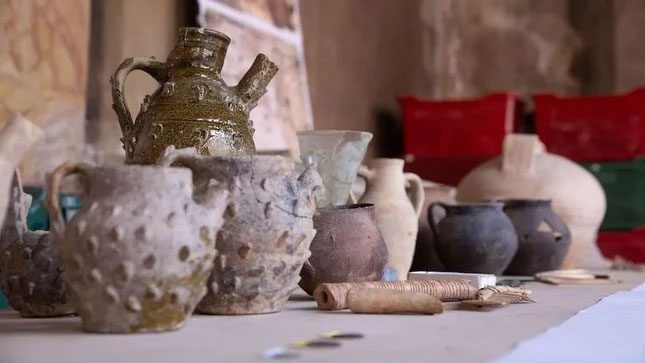Archaeologists in Rome Believe They Have Discovered Nero’s Theater During Hotel Excavation.
Archaeologists in Rome think they may have found the ruins of Nero’s theater, a royal performance space from the first century that has been frequently mentioned in ancient Roman texts, yet its whereabouts remain elusive.
The theater is named after Nero Claudius Caesar Augustus Germanicus, who was the Roman Emperor from 54 AD until his death in 68 AD.
Officials have called the discovery of the theater, located just east of Vatican City, “extraordinary.” According to ABC News, it may have been a place where Nero practiced poetry and performed music.

Some medieval artifacts uncovered during the archaeological excavation of Nero’s theater, discovered at the Palazzo della Rovere in Rome. (Photo: Pacific Press Media Production Corp./Alamy Live News).
Nero, the Emperor Fond of Music
More than a millennium after his death, Nero remains one of the most notorious rulers of ancient Rome, accused of indulging in pleasures while the city burned in a great fire.
While the brutality and poor governance under Emperor Nero have been widely discussed, including accusations of murdering his mother and two wives, and extravagantly squandering Rome’s wealth, he is also remembered as a lover of music and the arts. He dedicated performances at his own theater, a spectacle that the elite rarely attended. He particularly enjoyed playing the cithara, a stringed instrument similar to a small harp with seven strings.
However, when the emperor’s guard turned against him, he reportedly took his own life, exclaiming, “An artist has died in me!”
Researchers have unearthed numerous artifacts scattered throughout the ruins of the building. These include seven elaborately decorated medieval glass chalices, bone fragments used for carving beads, clay pots and vessels, bread-baking ovens, coins, bone combs, and numerous pieces of musical instruments.
Regarding the remaining architecture of the theater, archaeologists have excavated marble columns and plaster adorned with gold leaf, according to ABC News.
Marzia Di Mento, the head archaeologist for the area, told reporters at a press conference: “This is an incredible excavation, something every archaeologist dreams of. Being able to dig in this historically rich area is very rare.”
This discovery came to light as construction teams were restructuring the Palazzo Della Rovere, a medieval palace, into a new luxury hotel, with the theater being found buried beneath the surrounding walled garden of the project.


















































